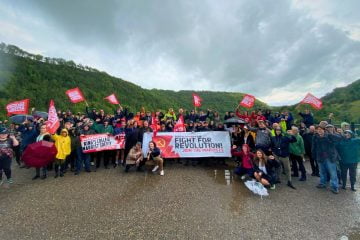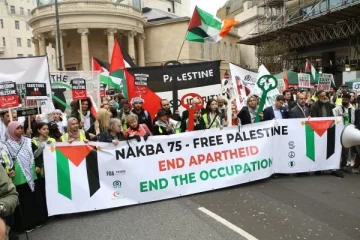On Tuesday 10th April 2018 the Queen Mary student occupation came to a close. For the past 30 days, 20-30 students at Queen Mary, in solidarity with the UCU lecturers’ strikes and against student bursary cuts, occupied the Octagon; a grade II listed space often referred to as “the heart” of the university.
Within the first few hours of the occupation, the following demands were discussed, written up, and sent to the management:
– Reverse bursary cuts;
– Redefine the purpose of bursaries from a marketing tool to a welfare system;
– Make university finance more transparent;
– The principal release a statement of solidarity with the UCU strike;
– The principal join striking staff on the picket; and
– Release gender pay gap and diversity data.
However, once the wave of lecturers’ strikes had ended, the demands were revised to concentrate on bursaries and financial transparency.
Initially, the management’s response was to ignore the demands and come down heavily on the occupying students. We were denied access to basic facilities, including toilets. A few supporters who attempted to bring us food were manhandled, and the food was subsequently thrown away.
Nevertheless, with help from the student union we were able to lobby management and get them to comply with our conditions. Following this, we managed to schedule a few more meetings with management. These often resulted in further comfort being added to the occupation itself, as opposed to discussing our actual demands. Hence, it often felt as though it was an occupation for an occupation’s sake – as apart from having secured the actual space, very little was achieved.
To combat this, more militant actions were carried out. For example, we disrupted a couple of management meetings (e.g. the senate meeting), through chanting and stomping. In one instance we managed to swarm the room. This gained us some visibility.
In the third week we also carried out a couple of sit-ins outside the Vice Chancellor’s office. This resulted in us achieving a meeting with the management, where we discussed the final demands. This meeting could have been far more effective had the delegates from the occupation correctly known the figures. Despite this, the management did offer us a transitional fund of £200,000 to go towards bursaries. Considering the deficit for home bursaries is £312,000 this was a fair achievement. However, when this was proposed to the rest of the occupation, we voted to reject the deal. This was since as now the management was actually listening to our demands, we wanted to take the struggle even further to secure the full amount.
This may well have been possible had we had an organised system in the occupation, by which the meetings we held would have concentrated on escalating the action, and mobilising the larger student community. Instead, the meetings were bureaucratic and lacked any real political substance or organisation, since they were dominated by the careerist and reformist layers of the Young Greens and Labour Students.
For example, on one instance we spent about an hour just discussing what time to hold the vote to carry on the occupation each day. Then when it finally came to discussing how to make the occupation a success, people were too tired to carry on the discussion. The pressing matters and tasks were then broken down and delegated to various “working” groups. These so-called working groups had no discipline, and for the most part did not even assemble.
There were clearly political disagreements within the occupation, however these disagreements were swept under the carpet. Instead of discussion and debate on these issues, various bureaucratic measures were taken to try to attempt to hide the fact that there were radical left groups present. The IMT, as well as other left groups, were not allowed to display any literature. This was a clear act of censorship, supposedly justified so as not to “frighten away MPs” or “alienate the masses”. Yet those in favour of this, failed to actually build for any mass mobilisation, which, after all, would require a bold political programme.
In the end, we were able to obtain a transitional fund of £260,000 over two years, which those that would have received bursaries (before the cuts) could claim. We also gained some financial transparency over university expenditure and the gender pay gap . However, the failure to get the student union to publicly support us and mobilise students to join our various demonstrations and the UCU picket lines meant that we weren’t able to put sufficient pressure on the university management. Thus, we were unable to achieve our full demands.
The point of Marxism is for us to learn the lessons from past movements, in order to successfully guide our action in the future. In future occupations we must not lose sight of the purpose of the struggle; in this case to support our striking staff, and to fight for a programme of progressive demands. To this end it is important to ensure that we organise effectively and gain mass student support on a political basis. We must take care not to shut ourselves off from the wider student body and staff.



